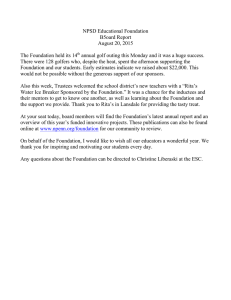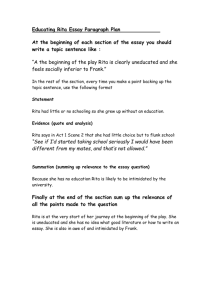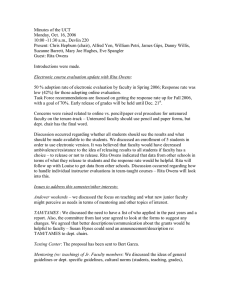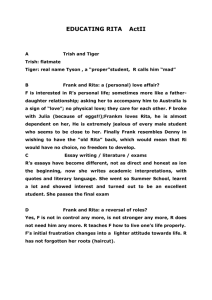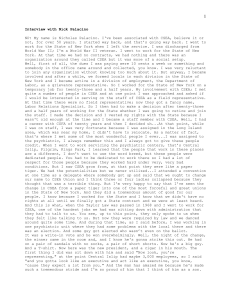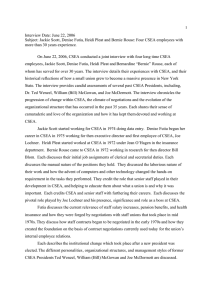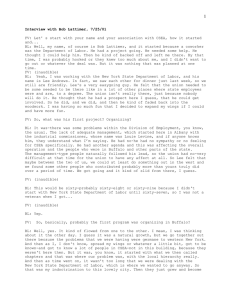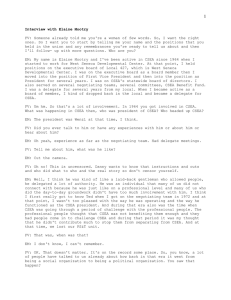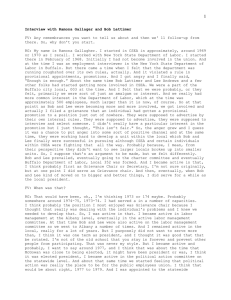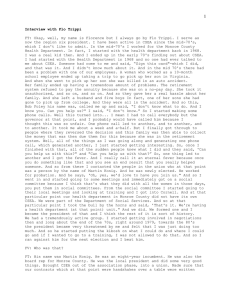Interview with Rita Fobrail
advertisement
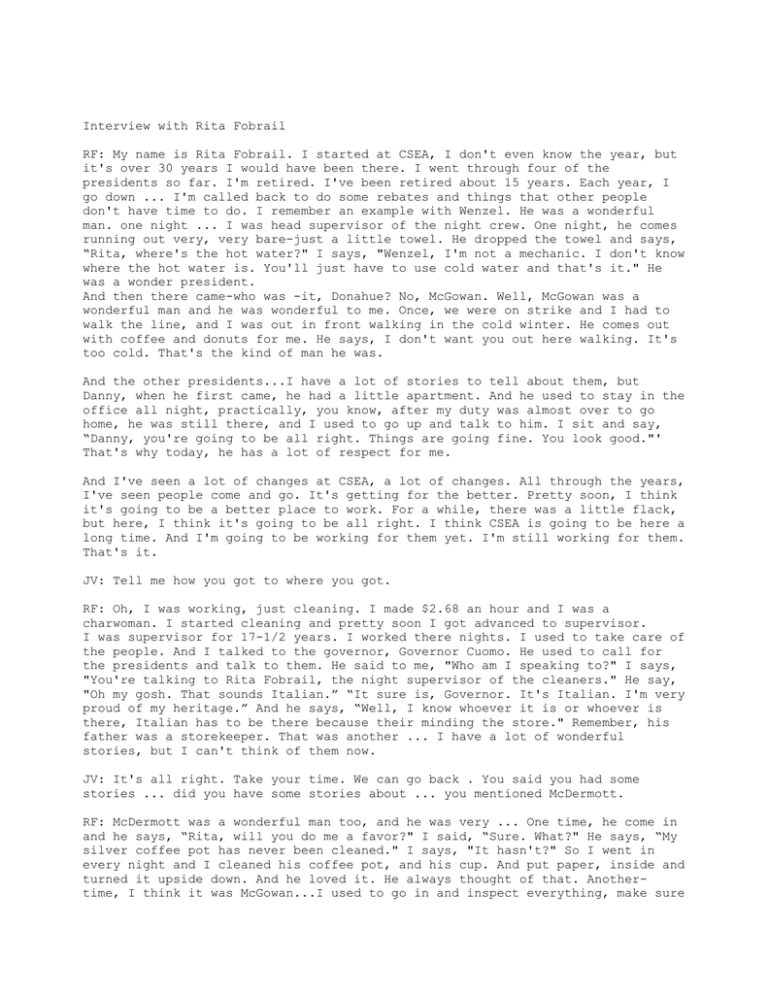
Interview with Rita Fobrail RF: My name is Rita Fobrail. I started at CSEA, I don't even know the year, but it's over 30 years I would have been there. I went through four of the presidents so far. I'm retired. I've been retired about 15 years. Each year, I go down ... I'm called back to do some rebates and things that other people don't have time to do. I remember an example with Wenzel. He was a wonderful man. one night ... I was head supervisor of the night crew. One night, he comes running out very, very bare-just a little towel. He dropped the towel and says, “Rita, where's the hot water?" I says, "Wenzel, I'm not a mechanic. I don't know where the hot water is. You'll just have to use cold water and that's it." He was a wonder president. And then there came-who was -it, Donahue? No, McGowan. Well, McGowan was a wonderful man and he was wonderful to me. Once, we were on strike and I had to walk the line, and I was out in front walking in the cold winter. He comes out with coffee and donuts for me. He says, I don't want you out here walking. It's too cold. That's the kind of man he was. And the other presidents...I have a lot of stories to tell about them, but Danny, when he first came, he had a little apartment. And he used to stay in the office all night, practically, you know, after my duty was almost over to go home, he was still there, and I used to go up and talk to him. I sit and say, “Danny, you're going to be all right. Things are going fine. You look good."' That's why today, he has a lot of respect for me. And I've seen a lot of changes at CSEA, a lot of changes. All through the years, I've seen people come and go. It's getting for the better. Pretty soon, I think it's going to be a better place to work. For a while, there was a little flack, but here, I think it's going to be all right. I think CSEA is going to be here a long time. And I'm going to be working for them yet. I'm still working for them. That's it. JV: Tell me how you got to where you got. RF: Oh, I was working, just cleaning. I made $2.68 an hour and I was a charwoman. I started cleaning and pretty soon I got advanced to supervisor. I was supervisor for 17-1/2 years. I worked there nights. I used to take care of the people. And I talked to the governor, Governor Cuomo. He used to call for the presidents and talk to them. He said to me, "Who am I speaking to?" I says, "You're talking to Rita Fobrail, the night supervisor of the cleaners." He say, "Oh my gosh. That sounds Italian.” “It sure is, Governor. It's Italian. I'm very proud of my heritage.” And he says, “Well, I know whoever it is or whoever is there, Italian has to be there because their minding the store." Remember, his father was a storekeeper. That was another ... I have a lot of wonderful stories, but I can't think of them now. JV: It's all right. Take your time. We can go back . You said you had some stories ... did you have some stories about ... you mentioned McDermott. RF: McDermott was a wonderful man too, and he was very ... One time, he come in and he says, “Rita, will you do me a favor?" I said, “Sure. What?" He says, “My silver coffee pot has never been cleaned." I says, "It hasn't?" So I went in every night and I cleaned his coffee pot, and his cup. And put paper, inside and turned it upside down. And he loved it. He always thought of that. Anothertime, I think it was McGowan...I used to go in and inspect everything, make sure Interview with Rita Fobrail everything was fine. I didn't like the bathrooms. I've been there too much. So, I let them a big sign, like that, that says, “Please aim that thing in the toilet, not on the wall." So, he showed everybody that sign. He had that sign for ... I said, "When are you going to get rid of that sign?" He says, “Well, nobody else would do it but you." That’s one good story. That's a story of human, you know, a human story. JV: Absolutely, that's what we want. RF: But that's ... I don't know what else to say. JV.- Well, whatever you remember. RF: I remember so much about CSEA. I remember, you know, lovely people, lovely bosses. They always had respect for me. Not, like today. He didn't have to come and talk to me, and kiss and hug me. After all, I'm nothing in the ... I'm small in the little ... but, he always had respect. JV: You took care of details. RF: Yep. I took care of that building, didn't I, Lorraine? She'll tell you. JV: Which building was this? RF: Right where we are now and the one down on Elk street. Worked down there too. yep. JV: What was that building like? It’s gone now. RF: It was a lovely building…grills (laughs). It was right next door to Two Street… know it we… I worked on Elk… Well, I don't want to go into too many. I'm liable not to go to work Monday. (laughs) No. They have a lot of respect for me. They really do, because I always took care of the building for them, made sure everything was right.. JV: How many people did you have working for you? RF: Well, I had about six underneath me. I had to organize, make sure that they get their work and that the work was done. If they didn't do it and somebody was out, I did it myself too. I pitched in and did I work right along with them. That's why I had respect. The fellow downstairs… that was one of the fellows I trained and he works for the state. And my son. I raised two sons. My son is director of the print shop and the room dowm there. And I have another son that’s president of motor vehicle local. JV: Is he? RF: Yeah, he's president of that. They were all CSEA, consistent. JV: Now, what time ... you worked late. What time did you start? RF: I used to go in about 4 o'clock and work until about 9, 9:30, somewhere in there. I had to lock the building up. I had to take care of the security, put the security on. Interview with Rita Fobrail JV: You saw a lot of things, cause a lot of people stayed and worked late... RF: Oh, yeah. And I always ... if any of the women worked late, I used to have the boys escort them outside in the lot. I would never let them go out there unescorted. Made sure. I think I did like a mother with a lot of the girls. A lot of the girls used to come to me with their problem& and I'd try to straighten them out. Not that I’m such a good person on that, but I raised three boys and I raised a granddaughter, so... JV: You raised a lot of people in CSEA too. RF: Yes, I sure did. I sure did raise a lot. JV: You were working until 9:30 and there's people hanging around the office... RF: They never...I threw them out. When I left, they left. I wouldn't let anybody stay in the building because that was my responsibility. JV: But up until 9 or 9.-30, you heard and saw some things. RF: Oh, I saw some wonderful things. I wouldn't want to tell half of them. Oh, no, I'm not gonna! (laughs) JV: You can tell me... RF: I've caught a lot of people in their offices, you know, and I've seen a lot of things. Another time-the girls used to get a kick out of me because I'm a kidder-too. They put a big sign in the ladies room, naked man, two or three naked men. And I thought I was gonna get shocked, but I took it down and wrote a big note on there, "Gee, thank you. I love this picture. I'm taking it home and frame it." JV: Did you tell them you already saw Wenzel, naked? RF: Oh, geez, I’m telling you. He was something. Wenzel was something. He was a good president, but he wasn't as friendly as these presidents after him. He was more reserved, but...I had some wonderful stories, but I can't think of them. I could write a book. JV: All right... RF: I go down there and work and I do booklets and things like that. I'm quite apt for it. That's what I do, just to get out of the house. JV: You saw a lot of things. What do you think makes you the proudest of being part of CSEA? RF: Because of the way they treat people. They're really basically ... like you and I, we're talking. They talked, would sit down and talk to us. I found that-maybe it's my personality-that's why they do that. I don't know if they do that with everybody in the building, but I found that I'd gotten along fine with everybody, don't I, Lorraine? Everybody in the building, I know. Even now. I'm not working there, you know; just part time, for maybe a month I'd be working. But it's a good place to work; a very good place to work. And if you mind your business, do your work, you're set. You're set. Interview with Rita Fobrail JV: When you worked for CSEA full-time, what do you think were the most important events that you saw? RF: Well, they used to have parties generally in the building. We never went out of the building. And they used to have some Christmas parties and they used to have-what other parties did they have that we always had big setups? Just the Christmas, wasn't it? Yeah, basically. JV: You guys would set them up and clean up afterward. RF: We used to clean up afterwards. I didn't set them up. The secretaries responsible for the setups and getting the place looking.-One time we had of the secretaries, Wenzel's secretary, I think it was, made it look like nightclub, and it was beautiful, you know. It was really nice. But we had the cleaning after, which wasn't so nice. were a-one a to do JV: When you cleaned up, how many people did you find under the tables? RF: I'd throw them out. They didn't stay there long (laughs). They were scared of me, I think. They never crossed me (laughs), because I didn't hesitate one minute to tell them what I thought. I wasn't afraid of nobody. I'm not afraid of anybody today, either, even president or not. I don't care who it is. If I have something to say, I'll say it. And that's it, but we had some good times. Picnics, we had wonderful picnics. They gave beautiful picnics. They always gave everything to eat, and everything was lovely. JV: Where did they have the picnics? RF: Oh, different places. Krausel’s and..yeah, Michael’s. But the only thing, I think, they don't invite the retirees to them anymore, so I don't get invited (laughs). Yeah, we don’t get invited to the parties, and I think that's not right because a lot of us would like to come and see other people that we know. JV: You're part of it still. RF: Yes. I'm surprised I'm here today. That's because I'm working down there. I wouldn't be here otherwise, today. JV: to? Do you remember any stories from these picnics and parties that you did go RF: Oh, yeah. There's plenty of stories. We had one girl-I I m not going to mention her name, either-she was high on drugs, and she was going around in circles, going around in circles. We had to go over and get her; get her to a place where nobody's around and made her lay down and sleep a while. Then we got her home. A lot of times at night, too, we used to have to do that. Call up the wife to come and get their husbands (laughs). JV: Ah, well. People, you know? RF: Yep. They didn't bother anybody. It's just that-but they were gonna get it when they got home; I know that. That's one thing. JV: Like I said, when people work hard, they have to play hard. Interview with Rita Fobrail RF: Yeah. Well. Sometimes that’s fine, but when you have a family, you get yourself home- to your family (laughs). That's how I feel. JV: So what do you see? What's the future of CSEA? RF: I think its s still gonna go strong, think no matter what. And I if they keep going they way they're going and what he’s trying to do, you know with CSEA, it’s fine. JV: You mean Danny? RF: Yeah. Danny’s a good guy. I think, anyway. That's my Opinion. He’s a good man. That's it. JV: Anything else you want to say, Rita, this is your chance. RF: Just that I want to thank CSEA for giving me the opportunity to be working for them all these years, and still continue to call me to come down and work for them. That means a lot to me. Thank you, and thank you. (laughs)
